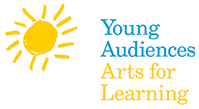COFFEE CHATS 1-3
Thursday, April 4 – 12:15pm CT
Chat 1: Creative Aging in Action: Building Relationships & Creating Safe Spaces
Facilitator: Jennifer Kubik, Program Coordinator, Think 360 Arts for Learning
As an organization celebrating its 60th year, Think 360 Arts for Learning has expanded its offerings to include older adult (55+) programs. Considering our first-year audiences are now in this demographic, we recognize the need for arts engagement throughout the entire lifespan. Collaborating with our community partners to fit this need, we developed rich relationships with communities throughout the state to serve older adults. In this chat, we will discuss what constitutes a quality arts program for older adults, strategies for building and maintaining relationships, and how the Creative Aging movement combats ageism.
Thursday, April 4 – 12:15pm – 1:00pm CT
Location: Dickinson I, 4th Floor
Tracks: Executive Leadership, Program Staff
Chat 2: Going Beyond the Numbers: Using Qualitative Data to Center Youth Voice
Facilitators:
Susanne Harnett (she/her), Managing Senior Associate, Metis Associates
Matt Klepfer (they/them), Research Analyst, Metis Associates
Andrea Allen (she/her), Research Analyst, Metis Associates
We can learn so much about a program’s impact through the expression and voices of the students we serve. Beyond the quantitative data from survey collection and other performance metrics, qualitative data can provide a fuller picture that can help inform both program design and advocacy. But how do we determine which qualitative measures to look at, and how do we review, analyze, and use the information? In this chat we’ll discuss these and other common questions and collectively share out successful strategies for qualitative assessment.
Thursday, April 4 – 12:15pm – 1:00pm CT
Location: Churchill, 3rd Floor
Track: Program Staff
Chat 3: Strategies for Building Effective Collaborations with Classroom Teachers
Facilitators:
Quynn Johnson, YA Nationally Credentialed Teaching Artist, Arts for Learning Maryland
Laura Marchese, YA Nationally Credentialed Teaching Artist, Young Audiences New Jersey & Eastern PA
Among Young Audiences teaching artists, a conversation arose about the challenges we sometimes face in building and nurturing relationships with classroom teachers around a mutual understanding of each other’s goals and boundaries. A teaching artist’s collaborative relationship with classroom teachers can make or break a residency and greatly impact student learning. The goal of this conversation is to create a list of shareable strategies for building effective collaborations with classroom teachers.
Thursday, April 4 – 12:15pm – 1:00pm CT
Location: Dickinson II, 4th Floor
Track: Teaching Artists
COFFEE CHATS 4-6
Friday, April 5 – 1:30pm CT
Chat 4: What Does Professionalism Look Like to You?
Facilitators:
Alexandra Novak Foster (she/her), Education Manager, Arts for Learning Connecticut
Clockwork Janz (they/them), Director of Creative Talent + Equitable Partnerships, Arts for Learning Indiana
Chris Espinosa-XYZ (he/him), YA Nationally Credentialed Teaching Artist, Young Audiences of Northeast Texas
In this conversation, we will explore what “professionalism” looks like across different cultural lenses in an effort to understand how to improve relationships and conversations between staff members, board members, and teaching artists. In a field where we all believe that students benefit from multi-modal learning, alternative learning practices, and alternative assessments, we often forget the importance of these practices in our daily lives and workplaces. We look to investigate how these themes can help us to all collaborate with more intention across our roles.
Friday, April 5 – 1:30pm – 2:15pm CT
Location: Churchill, 3rd Floor
Tracks: Teaching Artists, Program Staff
Chat 5: Arts Education and Materiality
Facilitators:
Erin Preston (she/her), Research Consultant, Chicago Arts Partnerships in Education (CAPE)
Mark Diaz (he/siya/sila), Associate Director of Education, CAPE
Brandon Phouybanhdyt (he/him), Program Coordinator, CAPE
Student agency is a core goal of learning in the arts; yet, research on learning in the arts has long equated student choice with agency. A more recent line of research in arts education has used a materialist lens of disrupting the binaries of nature and culture, human and non-human actors, to understand agency by looking at how we learn with materials. This has implications for how arts educators think about 1) differences between choice and agency, 2) our own relationships with materials and our bodies, and 3) how materials can disrupt disciplinary boundaries. Chicago Arts Partnerships in Education (CAPE) has been exploring how this notion of materiality intersects with their work on arts integration in school and community settings, and this investigation has shaped their professional learning for staff, teachers, and teaching artists. In this conversation, we’ll dig into these ideas together as we consider our post-Covid learning spaces: What new understandings about art education, in light of learning spaces infiltrated with arts practices, are possible when the agency is reframed as tied to materials?
Friday, April 5 – 1:30pm – 2:15pm CT
Location: Dickinson I & II, 4th Floor
Track: Program Staff
Chat 6: Board Member Meet and Greet
Facilitator:
David Dik (he/him), National Executive Director, Young Audiences Arts for Learning
Join this informal space for networking and conversation with other board members and advisory council members from around the country.
Friday, April 5 – 1:30pm – 2:15pm CT
Location: Dickinson III, 4th Floor
Track: Executive Leadership
